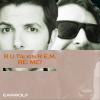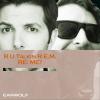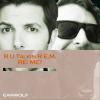Reviewing 'R U Talkin' R.E.M. RE: ME?': Eps. 9 and 10, Out of Time and Automatic for the People

Editor's note: On the new comedy podcast "R U Talkin' R.E.M. RE: ME?", hosts Scott Aukerman and Adam Scott dive deep into the legendary Athens band's discography. Local superfan Tim Kelly is reviewing the podcast for Flagpole.
“It’s a band in transition, and Automatic is what they transitioned into.”
—Adam Scott re: Out of Time
Why are you writing these pieces, Tim? It’s a valid question, voice in my head (and internet commenters). I attempted a mission statement in my first entry—it's a celebration of fandom in general, while acknowledging the ridiculousness of a review of a podcast reviewing a band. Now, after finishing these two episodes, other motivations are making themselves clear, one of which was hiding in plain sight the whole time: nostalgia.
When all is said and done and the book is closed on Tim Kelly, there will not be an album with a more formative impact on my life than Out of Time. Listening to it over and over again during the summer of 1991 reprogrammed my brain and shaped not only my musical tastes but life-changing decisions for me in the years to come. Hearing Adam and Scott break down and dissect these tracks brought me back to those days of hearing it, being amazed by it, for the first time.
As Scott points out in the episode, Out of Time is a “weird” album. Whether you agree with him or not on whether "Low" and "Belong" “are even songs” (they are) or whether "Shiny Happy People" is an abomination (it’s not), his point is taken. A rap-rock lead track, mandolin-heavy super hit, an instrumental, Kate Pierson on three tracks—this was not a typical R.E.M. release. And let me tell you, it was WAY weirder for a 13-year-old kid just beginning to find his way into music.
Fast forward a year and a half, and 14-year-old me was a full-fledged R.E.M. fanatic anxiously awaiting their next release. I coaxed a friend who lived nearby our high school (and had cable!) to skip class with me the afternoon the “Drive” video premiered on MTV. I asked my father, who had probably… never?… been inside a record store, to stop on his way home from work to pick up Automatic for the People (on tape!).
And Automatic—wow. If you haven’t listened to it start to finish recently, do it now. Last October, my wife and I brought our kids to the #Automatic25 event at the 40 Watt, a listening party to benefit local charities and honor the 25th anniversary of the album’s release. I was excited to go, to see friends and for our sons to run around the 40 Watt—hey, kids, you’re so lucky—but not necessarily to hear the album. I’d heard it countless times before. But then the remastered version of “Drive” kicked in, and bam, I was back in my bedroom on Daisy Road listening to the tape on my sad, old stereo. I was hypnotized for the next hour, coming up for air every now and then to appreciate my sons dancing to “Sidewinder Sleeps Tonite” and the fact that I was here at the 40 Watt at all.
What a one-two punch for someone like me just getting into music. Out of Time broke my brain with its surprising track choices and jarring shifts from slow dirges to jangly bubblegum pop songs. Automatic followed, a universally acclaimed masterpiece and one of rock’s greatest albums of all-time. It’s easy to see why I, and why so many of us, became obsessed.
I turned 40 this year, and I’ve been to several 40th birthday parties for friends this year, so heck yeah, I’m nostalgic. And nostalgia can be good. I love sitting in the room “with” Adam and Scott—slightly older than me, but still contemporaries—as they appreciate and argue over these songs, like friends and I have done for over 25 years now. I can revel in yesteryear with the best of them, and yet I can’t wait to see what captures the imagination of our sons in the years to come, and what song might come up next over satellite radio or my Discover Weekly playlist (OK, so I have to cheat a bit these days to find my music). Nostalgia is great, but we can’t get stuck there, and that’s no place to be. As they say, the road goes ever on and on.
In Defense of "Shiny Happy People":
Without it, the world would never have had this:
Highlights from the Scotts:
- Scott’s story about Ed Asner banging the piano on set of the Sarah Silverman show;
- “Calm down, calm down, don’t get so defensive!” “But you’re making stuff up!!” — Scott and Adam sniping over whether “Low” is a song;
- Adam handed out mix CDs to his wedding guests. Scott, re: those CDs: “What percentage of those wound up in trash cans? Sixty-five?”;
- “I love songs that teach me how to count” — Scott;
- Adam reveals he was an extra in the “Drive” video, but he had never been able to find himself in the crowd when the video was released. Podcast listeners were able to isolate the frame and found him. This is Adam Scott’s first official onscreen appearance in TV/film/music video, and the "Drive" Wikipedia page has been updated to include his appearance;
- Adam wanted to talk to Mike Mills on set of the “Drive” video, but all he could think of to say was, “So, what’s the new stuff like?”;
- The episode of “I Love Films” within the Automatic episode is the all-time BEST episode of #ILoveFilms;
- Adam performed an interpretative dance to “Try Not to Breathe” that featured a multimedia component for a project in acting school;
- “Fruity Organ” is Scott’s favorite R.E.M. song
Corrections:
- Face/off technology is not real and is not used commonly within the entertainment industry;
- The Emmys do not give out an award in the category “Best Larynx”;
- Once and for all: The band formed by fictional characters Charlie and Liam Pace in the television show “Lost” was named Drive Shaft, and their hit single was “You All Everybody”;
- Adam did not “single-handedly” win the election for Bill Clinton in 1992;
- Adam did not go to school with the fictional Corleone family from the hit novel and movie series The Godfather;
- R.E.M. did not sleep upside down like bats while living in the church that would become the site of their first performance;
- You should not tell your family and loved ones to “try not to breathe” before you leave for work every morning;
- A traditional New York-style pizza does not have water poured over top of it immediately after cooking;
- Bill Berry did not hit the heads of band and audience members instead of drums during the 1992 Greenpeace performance at the 40 Watt
Stone-Cold Classics:
"Near Wild Heaven"
"Find the River"












comments